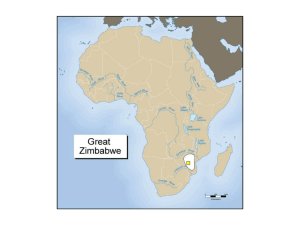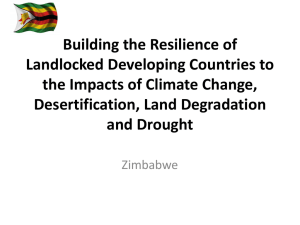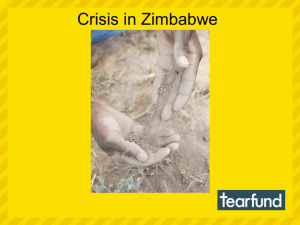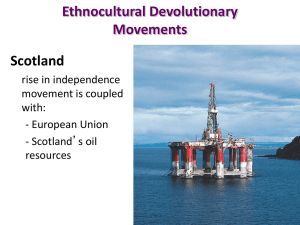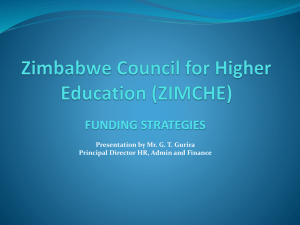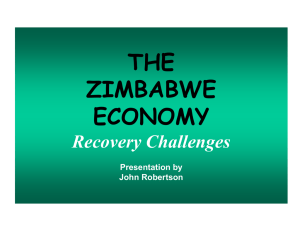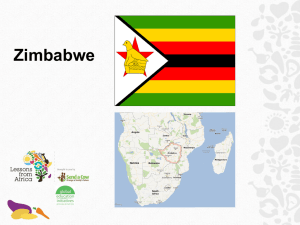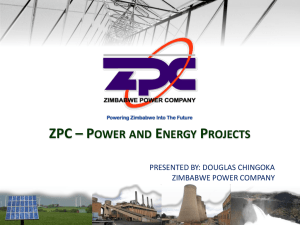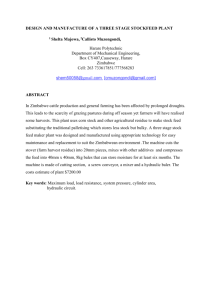Identification of some at-risk groups of Haitians and Zimbabweans
advertisement
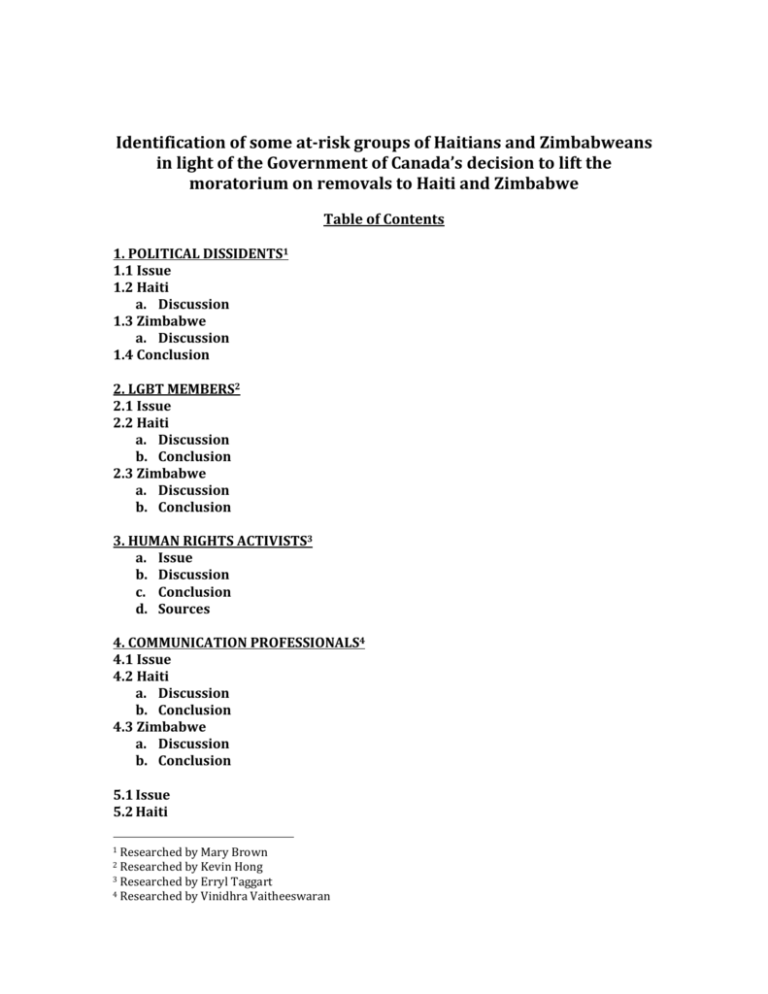
Identification of some at-risk groups of Haitians and Zimbabweans in light of the Government of Canada’s decision to lift the moratorium on removals to Haiti and Zimbabwe Table of Contents 1. POLITICAL DISSIDENTS1 1.1 Issue 1.2 Haiti a. Discussion 1.3 Zimbabwe a. Discussion 1.4 Conclusion 2. LGBT MEMBERS2 2.1 Issue 2.2 Haiti a. Discussion b. Conclusion 2.3 Zimbabwe a. Discussion b. Conclusion 3. HUMAN RIGHTS ACTIVISTS3 a. Issue b. Discussion c. Conclusion d. Sources 4. COMMUNICATION PROFESSIONALS4 4.1 Issue 4.2 Haiti a. Discussion b. Conclusion 4.3 Zimbabwe a. Discussion b. Conclusion 5.1 Issue 5.2 Haiti Researched by Mary Brown Researched by Kevin Hong 3 Researched by Erryl Taggart 4 Researched by Vinidhra Vaitheeswaran 1 2 1. POLITICAL DISSIDENTS 1.1 Issue What risks do political dissidents from Haiti and Zimbabwe face if and when they are returned to their home countries? 1.2 Haiti a. Discussion Harassment and violence against human rights activists and political opponents of the current government has been documented by Amnesty International. Political demonstrations have been responded to with “excessive force” and have resulted in the deaths of protestors by security forces. 5 The 2015 World Report documents specific cases of threats and violence committed against human rights activists. Malya Vilard Apolon and Marie Eramithe Delva, cofounders of Komisyon Fanm Viktim Pou Viktim, a women’s rights organization within the country, left Haiti in 2014 after enduring sustained harassment and threats because of their human rights work.6 In February 2014, Girldy Lareche and her husband Daniel Dorsinvil, the general coordinator for the Platform of Haitian Human Rights Organizations, were murdered in Port-au-Prince. The human rights community strongly suspects they were murdered for their activism. 7 There continues to be ongoing arbitrary arrests and detentions of political protestors.8 The United States Department of State, in their 2012 Human Rights Report on Haiti, acknowledged that there is politically motivated harassment, kidnappings, disappearances and murder, often carried out by the Haitian National Police.9 Lawyers engaged in human rights work are also vulnerable. Lawyers Patrice Florvilus (threatened and falsely charged), Andre Michel (threatened and illegally arrested), and Mario Joseph (threatened), and Judge Jean Serge Joseph (died under “suspicious Amnesty International, “Open Letter to Evans Paul, new Prime Minister of Haiti: Put human rights as the priority of your new government” (2 February 2015) 1, online: <http://www.amnesty.org/en/library/asset/AMR36/004/2015/en/4c6c1822-1d17-4ac8-acdfd6c97eaecb83/amr360042015en.pdf>. 6 Human Rights Watch, “World Report 2015”, 269, online: <http://www.hrw.org/worldreport/2015>. 7 Ibid at 269. 8 Morenike Fajana and Nicole Phillips “The Targeted Arrest and Detention of Political Prisoners in Haiti” (12 January 2015) online: Fair Trials <http://www.fairtrials.org/press/guest-post-thetargeted-arrest-and-detention-of-political-prisoners-in-haiti>. 9 U.S. Department of State, “2012 Human Rights Reports: Haiti”, (19 April 2013), online: <http://www.state.gov/j/drl/rls/hrrpt/2012/wha/204458.htm>. 5 circumstances”) and are just a few of the individuals recognized by Amnesty International and facing persecution in the country.10 The Haitian police and larger criminal justice system is profoundly dysfunctional: arbitrary arrests and long pre-trial detentions are common.11 The United Nations’ August 2014 Report on its stabilization mission in Haiti reports on the high rates of violence (416 reported cases of murder and 154 reported cases of rape between March and August 2014) and the inadequate police force.12 Gustavo Gallon, independent expert on the situation of human rights in Haiti, reported in February 2014 that the human rights situation in the country was “extremely serious”. His report is specific and confirms reports from grassroots organizations of politically motivated threats and violence.13 1.3 Zimbabwe a. Discussion Zimbabwe is a “priority” country for Amnesty International. The organization reported in early December that pro-democracy activists had been beaten and arrested by suspected supporters of the Mugabe government and then handed over to the police who failed to arrest the perpetrators. November also saw numerous attacks, this time by police, against pro-democracy and human rights activists.14 These human rights abuses run counter to the values enshrined in the Zimbabwean Constitution of 2013, specifically sections 58 to 61 (Freedom of Assembly and Association, Freedom to Demonstrate and Petition, Freedom of Conscience and Freedom of Expression and the Media).15 The 2013 election which resulted in a continuation of the political status quo, was “deeply flawed” according to the US Department of State.16 Nicole Phillips “Human Rights Defender Murder is Part of a Pattern” (18 February 2014), online: Institute for Justice & Democracy in Haiti <http://www.ijdh.org/2014/02/topics/lawjustice/leading-human-rights-activist-daniel-dorsainvil-and-wife-killed-in-haiti>. 11 Supra note 5 at 267. 12 United Nations Security Council, “Report of the Secretary-General on the United Nations Stabilization Mission in Haiti” (29 August 2014), 3, online: <http://www.un.org/ga/search/view_doc.asp?symbol=S/2014/617>. 13 Gustavo Gallon, “Report of the independent expert on the situation of human rights in Haiti,” (7 February 2014) United Nations General Assembly, 17, online: <http://reliefweb.int/sites/reliefweb.int/files/resources/A-HRC-25-71_en.pdf>. 14 Amnesty International, News Release, “Zimbabwe: Authorities must act against attackers of prodemocracy activists” (3 December 2014) online: <http://www.amnesty.ca/news/newsreleases/zimbabwe-authorities-must-act-against-attackers-of-pro-democracy-activists>. 15 Constitution of Zimbabwe Amendment (No. 20) Act, 2013 (29 January 2014), online: Zimbabwe Government Online, <http://www.zim.gov.zw/index.php/documents/constitution-of-zimbabwe>. 16 Bureau of African Affairs, U.S. Department of State, “U.S. Relations with Zimbabwe Fact Sheet” (30 January 2014), online: <http://www.state.gov/r/pa/ei/bgn/5479.htm>. 10 A Human Rights Watch report published in 2013 documents the allegiance of Zimbabwe security forces to the ruling party – ZANU-PF – lead by President Robert Mugabe and its use to threaten, intimidate and terrorize members of the opposition as well as political activists.17 The 2015 World Report documents how police have used the Public Order and Security Act (POSA) to restrict protesting, often through violence and arbitrary arrests. Among many others, gatherings by the Women of Zimbabwe, the National Students Union, the political party Transform Zimbabwe, and the Bulawayo Agenda organization have been dispersed and members arrested under POSA. Human Rights Watch reports that these arrests usually result in no official charges being laid.18 The Zimbabwe Peace Project (ZPP)’s latest report from October 2014 documents various types of human rights abuses, mostly intra-party fighting between ZANU-PF and the main opposition party, MDC. This aligns with the United Kingdom’s Operational Guide for those seeking political asylum from Zimbabwe which states that: “… the evidence does not show that, as a general matter, the return of a failed asylum seeker from the United Kingdom, having no significant MDC profile, would result in that person facing a real risk of having to demonstrate loyalty to the ZANU-PF.”19 However, the Guide continues that there may be a risk of violence depending on the area to which the person returns, notwithstanding their lack of political involvement.20 The ZPP report also documents cases of food and agricultural aid being contingent on political support with the police playing an aggressive and active role in ensuring compliance.21 1.4 Conclusion Many political dissidents -- political party members, political activists, lawyers, judges and academics – will likely face persecution upon return to Haiti and Zimbabwe. Both countries continue to struggle to recognize democratic rights such as freedom of speech and freedom of association. Political dissidents are at risk of being treated as criminals and face haphazard justice within broken criminal justice systems. Human Rights Watch, “The Elephant in the Room” (5 June 2013), 2-3, online: <http://www.hrw.org/reports/2013/06/05/elephant-room>. 18 Human Rights Watch, “World Report 2015”, 632, online: <http://www.hrw.org/worldreport/2015>. 19 United Kingdom Home Office, “Country Information and Guidance: Zimbabwe: Political Opposition to ZANU-PF” (October 2014), 5, online: <https://www.gov.uk/government/uploads/system/uploads/attachment_data/file/364128/CIG_Zi mbabwe_Political_Opposition_v1_0.pdf>. 20 Ibid at 5-6. 21 Zimbabwe Peace Project, “ZPP Monthly Monitor” (October 2014), 3, online: <http://www.zimpeaceproject.com/index.php?option=com_phocadownload&view=categories&Item id=107>. 17 2. LGBT MEMBERS 2.1 Issue Are there policies or laws in Haiti and Zimbabwe that explicitly or implicitly place members of the LGBT community in that country at risk? 2.2 Haiti a. Discussion Constitutional Protections The Constitution of Haiti does not specifically identify sexual orientation as a prohibited ground for discrimination. Nevertheless, the Constitution does guarantee other fundamental rights and freedoms such as respect of the human person for citizens, freedom of expression, freedom of conscience, and individual liberty (Loi constitutionnelle de 2012 portant amendement de la Constitution de 1987 (Haiti), 167eme Année No 96, s 19, 24, 28, 30-1). Legislation The Haitian Penal Code does not prohibit consensual sexual relations between members of the same sex. Nevertheless, LGBT individuals have been known to be prosecuted under other criminal law provisions and are subject to arbitrary arrest and detainment. In the past, police have charged LGBT individuals with immorality and indecency (ANAPFEH et al, “Supplementary Information On Haiti Regarding the Treatment of Lesbian, Gay, Bisexual and Transgender Individuals (LGBT)” (Report delivered at the United Nations Human Rights Committee 105th Session, Geneva, Switzerland, July 2014), online: <http://tbinternet.ohchr.org/Treaties/CCPR/Shared%20Documents/HTI/INT_CCPR_IC O_HTI_16058_E.docx>). Members of the Haitian parliament have publically stated that they would and should not consider LGBT rights legislation, making any advances unlikely in the near future (US Department of State, Country Reports on Human Rights Practices for 2013: Haiti, online: US Department of State <www.state.gov/j/drl/rls/hrrpt/humanrightsreport>). Enforcement LGBT individuals face substantial barriers to access to justice due to uncooperative police and judicial officials. Officers and judges are reported to have even participated in the harassment and discrimination in some cases. As a result, LGBT individuals do not feel safe reporting abuse or harassment. For example, a justice of the peace summarily dismissed a claim of assault when the male defendant accused the male LGBT victim of having molested him in his sleep. The justice of the peace used derogatory language while doing so. In another case, an LGBT man complained to police about an assault by his brother. However, after his brother told them he was gay, “they slapped [him] and laughed. They beat [him] even worse than he did” (supra “Supplementary Information On Haiti Regarding the Treatment of Lesbian, Gay, Bisexual and Transgender Individuals (LGBT)”). Social Attitudes There is strong societal opposition to minority sexual identities. Aside from ostracism and discrimination, LGBT individuals may be victims of corrective rape with multiple perpetrators (supra “Supplementary Information On Haiti Regarding the Treatment of Lesbian, Gay, Bisexual and Transgender Individuals (LGBT)”). The lack of legal protections and willingness of police to protect them, has meant these crimes have gone unreported. As mentioned above, “many police officers refuse to accept or believe complaints from “masisi” [a derogatory term for effeminate gay men]” (supra “Supplementary Information On Haiti Regarding the Treatment of Lesbian, Gay, Bisexual and Transgender Individuals (LGBT)”). Advocacy groups have registered high distrust for government officials and insecurity in the capital than in rural areas. Nevertheless, even in areas where there are no complaints of misconduct by government officials, LGBT individuals may still fear reporting hate crimes due to the stigma attached to minority sexual orientations (US Department of State, Country Reports on Human Rights Practices for 2013: Haiti, online: US Department of State <www.state.gov/j/drl/rls/hrrpt/humanrightsreport>). LGBT individuals have also been excluded from government economic programs. In the wake of the 2010 Haitian Earthquake, the government instituted a series of reconstruction programs which paid workers a living wage. However, LGBT individuals were largely unable to secure positions with the program (supra “Supplementary Information On Haiti Regarding the Treatment of Lesbian, Gay, Bisexual and Transgender Individuals (LGBT)”). b. Conclusion While there are no laws or policies that explicitly criminalize minority sexual orientations or consensual same-sex relations between adults, there is a lack of legal protection for LGBT individuals. Police and judicial officials have been unwilling to protect LGBT individuals from abuse or discrimination – and have even participated in such behaviour. This, along with negative social attitudes, has led to LGBT individuals not reporting abuse. 2.3 Zimbabwe a. Discussion Constitutional Protections The Constitution of Zimbabwe protects the fundamental rights and freedoms that are common to most liberal democracies: life, liberty, and security of person. It states that all individuals are “equal before the law and have the right to equal protection and benefit of the law” (Constitution of Zimbabwe Amendment (No 20) Act, 2013 (Zimbabwe), s 56(1)). It also acknowledges the inherent dignity every individual is entitled to in both public and private life (Constitution of Zimbabwe Amendment (No 20) Act, 2013 (Zimbabwe), s 51). Nevertheless, it does not set out sexual orientation as a listed ground for discrimination. Indeed, the constitution specifically prohibits same sex marriages (Constitution of Zimbabwe Amendment (No 20) Act, 2013 (Zimbabwe), s 78(3)). Legislation The Criminal Law Act criminalizes consensual sex between men, but not women. S.73, which proscribes sodomy states: (1) Any male person who, with the consent of another male person, knowingly performs with that other person anal sexual intercourse, or any act involving physical contact other than anal sexual intercourse that would be regarded by a reasonable person to be an indecent act, shall be guilty of sodomy and liable to a fine up to or exceeding level fourteen or imprisonment for a period not exceeding one year or both. (Criminal Law (Codification and Reform) Act (Zimbabwe), Ch 9:23, s 73) Those convicted under s. 73 can be fined $5000, face one year imprisonment or both. However, it has been known for one partner may deny earlier consent in order to escape conviction. This may lead to a charge of aggravated indecent assault or indecent assault against the other individual. These charges can result in life imprisonment (US Department of State, Zimbabwe, online: US Department of State <http://travel.state.gov/content/passports/english/country/zimbabwe.html>). The government may use other provisions in the Criminal Law Act and other legislation to suppress the promotion or expression of LGBT rights. For example, criminal insult charges have been laid under s. 95 against those who criticize government or religious leaders. The penalty is a fine of up to $300, face one year imprisonment, or both (US Department of State, Zimbabwe, online: US Department of State <http://travel.state.gov/content/passports/english/country/zimbabwe.html?p age=2>). Recently, LGBT activists have also been charged with running unregistered voluntary organizations (under the Private Voluntary Organization Act), or running workshops without prior police clearance (under the Public Order and Security Act) (Human Rights Watch, World Report 2015: Zimbabwe, online: Human Rights Watch <http://www.hrw.org/worldreport/2015/country-chapters/zimbabwe?page=2>). There has also been reported arbitrary detention and arrest of LGBT individuals by police. The non-governmental group, Gays and Lesbian of Zimbabwe (GALZ), particularly has faced harassment by government actors (Human Rights Watch, World Report 2014: Zimbabwe, online: Human Rights Watch <http://www.hrw.org/world-report/2014/country-chapters/zimbabwe>). Police have not offered protection to lawyers representing LGBT individuals. Members of the Chipangano gang, which is affiliated with the governing ZANUPF party, have harassed and threatened lawyers representing individuals charged with sodomy (Amnesty International, Annual Report 2012: Zimbabwe, online: Amnesty International <http://www.amnesty.org/en/region/zimbabwe/report-2012>). Position of Leadership Both political and religious leaders in Zimbabwe have stated strong opinions against LGBT behaviour and individuals in official capacities. President Robert Mugabe reportedly stated “"We don't accept homosexuality here. God made men and women so they can bear children” (Peta Thornycroft, “Robert Mugabe says he prefers Chinese aid because Beijing does not force him to accept homosexuality”, The Telegraph (31 August 2014) online: < www.telegraph.co.uk>). At his inauguration speech in 2014, he described homosexuality as “filthy, filthy, filthy disease” (Human Rights Watch, World Report 2014: Zimbabwe, online: Human Rights Watch <http://www.hrw.org/world-report/2014/country-chapters/zimbabwe>). He has also stated that he believes LGBT individuals to be “worse than dogs and pigs” and threatened to behead them (Human Rights Watch, World Report 2014: Zimbabwe, online: Human Rights Watch <http://www.hrw.org/worldreport/2014/country-chapters/zimbabwe>). The Mugabe-backed former Bishop of Harare, Nolbert Kunonga has written that “we totally reject homosexuality; it is an abomination, it is totally against the law of God, and it diminishes the dignity of the human being” (Tabona Shoko, ““Worse than dogs and pigs?” Attitudes Toward Homosexual Practice in Zimbabwe” (2010) 57:5 J Homosexuality 643). While Kunonga has been excommunicated, he still wields considerable power and influence with support from President Mugabe. This stance has been taken by politicians regardless of political affiliation. Former Prime Minister Morgan Tsvangirai of the opposition has taken positions on both sides of the issue, but has at one time voiced his opinion against same sex marriage and sexual relations between men (“Zimbabwe PM Morgan Tsvangirai rejects gay rights move”, BBC News (26 March 2010), online: <news.bbc.co.uk>). Social Attitudes The lack of legal protection and support from police has exacerbated the social stigma attached to homosexuality in many parts of Zimbabwean society. Hate crimes are committed against sexual minorities – and especially against women – with impunity. Ostracism of LGBT individuals from both households and even workplaces is common (Bernedette Muthien, The Status of Sexual Minorities in Southern Africa, online: Oxfam < www.oxfam.de/files/The_status_of_sexual_minorities_in_Southern_Africa_-- _FINAL.pdf > at page 14). Many acts of violence are not reported due to the stigma and also because many perpetrators are relatives of the victim. Relatives may commit corrective rape or conduct forced marriages to “rehabilitate” individuals (US Department of State, Country Reports on Human Rights Practices for 2013: Zimbabwe, online: US Department of State <www.state.gov/j/drl/rls/hrrpt/humanrightsreport>). LGBT individuals often drop out of school earlier. Rates of unemployment and homelessness also tend to be higher amongst the LGBT community (US Department of State, Country Reports on Human Rights Practices for 2013: Zimbabwe, online: US Department of State <www.state.gov/j/drl/rls/hrrpt/humanrightsreport>). b. Conclusion LGBT individuals are subject to discriminatory and adverse constitutional and statutory provisions. They also face a lack of state protection from crime as neither the constitution nor statutes list sexual identity as a prohibited grounds of discrimination. Same-sex marriage is barred by the Constitution of Zimbabwe, while statutes criminalize sexual activity between men. The risks facing the LGBT community is exacerbated by current political and religious leadership in Zimbabwe who are opposed to LGBT rights. These leaders have made open threats against LGBT individuals. The social condemnation of minority sexual identities has led to unpunished violence against LGBT individuals. As a result of these factors along with the lack of legal protection, LGBT individuals are often the victim of crime and discrimination with no recourse to the law. 3. HUMAN RIGHTS ACTIVISTS a. Issue Are human rights activists in danger of persecution in Haiti or Zimbabwe? Are there implicit or explicit public policies which perpetuate that risk? b. Discussion Political Activists The highest reported risk facing political activists in both countries is the risk of arbitrary arrest. Political activists in Haiti have been subject to arbitrary arrest. On 26 October 2014, political activists Biron Odige and Rony Timothée were arrested on charges of “inciting violence and disturbing the public order” while at a peaceful demonstration in Port-auPrince (Haiti Sentinel [HS], 27 October 2014). Odige and Timothée were “imprisoned that same day without being interviewed by any judicial authority” (HS, 1 November 2014). Timothée, a spokesman for the Patriotic Force for the Respect of the Constitution (FOPARK), had been arrested earlier in 2014 when he was imprisoned for 19 days before a judge found there was “no basis for the charges placed on him” (HS, 4 June 2014). Ti Elizé, another member of FOPARK was arrested on 26 December 2013 for protesting the arrest of another political activist, Louima Louis-Juste (HS, 27 December 2013). Zimbabwean political activists similarly face the risk of arbitrary arrest. On 8 February 2015, seven members of the Movement for Democratic Change – Tsvangirai (MDC – T) were arrested while protesting current unemployment rates for endangering the free flow of persons or traffic (New Zimbabwe, 8 February 2015). When the detainees appeared before the court for their bail hearing, they testified that they had been assaulted while in police custody (New Zimbabwe, 8 February 205). Earlier, in 2013 29 MDC-T activists were acquitted of the murder of a police officer (Amnesty International Media Centre [AI], 19 September 2013). Amnesty International remarks that “it is widely believed that most of the suspects were arrested solely because they were known MDC-T activists living in Glen View at the time of Petros Mutedza’s death” (AI, 19 September 2013). Freedom House noted that, in 2014 “MDC politicians, activists, and supporters were still subject to harassment, assault, and occasional arbitrary detention by security forces, militias, and supporters of ZANU-PF” (Freedom House, 2014). Political activists in Zimbabwe have also been the victims of abduction. On 2 December 2014, three members of Occupy Africa Unity Square were abducted from a peaceful demonstration, severely assaulted, and finally released into police custody by their abductors (AI, 3 December 2014). Human Rights Activists Human rights activists in Haiti face a variety of risks, including murder and receiving death threats. A Haitian human rights activist was recently targeted for assassination. Daniel Dorsinvil, General Coordinator of the Platform of Haitian Human Rights Organizations, and his wife Girldy Larêche were shot and killed by unknown gunmen on 10 February 2014 (The Sentinel [Sentinel], 10 February 2014). Although no one has claimed responsibility for the murders, local human rights activists and lawyers claim that Dorsinvil and Larêche’s murders were “political crimes” (Sentinel, 10 February 2014). Pierre Espérance, executive director of the National Human Rights Defence Netowrk, received a death threat by mail on 2 April 2014 (HS, 15 April 2014). The letter accused Espérance of attempting to destabilize President Martelly’s government. The letter also included a bullet and a promise not to miss this time. Espérance is the survivor of a previous violent attack—he was shot in the knee and shoulder in 1999 (HS, 15 April 2014). Members of women’s rights groups in particular have been victims of threats. In June 2014, Members of Gwoup Apu pou Developman Depatman Sid (GADES) received a serious of threatening phone calls to their personal phones (AI, 4 August 2014). The women had been supporting a young boy who was pressing charges for rape against a police officer. The women were told to “stop doing that work, otherwise you will lose human lives” (AI, 4 August 2014). In response to the threats, GADES decided to close their offices between 25 and 30 June 2014 (AI, 4 August 2014). A false report of drug possession was also made against one of the members of GADES (AI, 4 August 2014). Similar telephone threats were made against the members of Komisyon Fanm Viktim Pou Viktim (KOFAVIV), another Haitian women’s rights group (AI, 13 June 2014). Gunshots were also heard near the KOFAVIV office on 28 April 2014, and armed assailants were seen “hitting the stairs’ bannister” (AI, 13 June 2014). In Zimbabwe, human rights activists reported being disparaged, assaulted, and arbitrarily arrested. As Amnesty International has pointed out, “arbitrary arrests, unlawful detentions and spurious charges have been used systematically as tools to silence individuals and groups working to promote human rights” (AI, 27 November 2013). This pattern has persisted despite the coming into force of Zimbabwe’s new constitution (AI, 22 May 2014). NGOs as organizations have recently come under government scrutiny. The Chief Spokesperson for the Zimbabwe Republic Police (ZRP) was quoted saying that “ZRP has it on good authority that certain entities like the ZPP purport to be engaged in humanitarian work as an NGO whereas they are an illegal conduit to the regime change agenda by carrying out covert political activities tantamount to causing a threat to state security and violating the country’s laws” (AI, 26 February 2013). The US Department of Justice notes that “[civil society organization] staff in Harare and throughout Zimbabwe have been accosted by security sector staff and arbitrarily arrested” (United States Department of Justice). “On February 11 [2013], in what appears to have been coordinated action, police raided the offices of the National Association of NGOs (NANGO) and Community Tolerance Reconciliation and Development (COTRAD) in Masvingo and the Zimbabwe Peace Project (ZPP) offices in Harare” (Human Rights Watch News [HRW], 19 March 2013).” Police have been searching offices and seizing radios – the preferred means of communication in rural areas (Community to Protect Journalists [CPJ], 2013). Particular NGO directors appear to have been targeted for arrest. In March 2013 Zimbabwe state-owned television broadcast an announcement that Jestina Mukoko, director of the Zimbabwe Peace Project, was fleeing prosecution. Mukoko, who was at home when the broadcast aired, turned herself in to local police the next morning, at which time she was charged with several offences (AI, 8 March 2013). Also in 2013 Abel Chikomo, Director of the Zimbabwe Human Rights NGO forum, was acquitted of the charge of running an illegal organization (AI, 22 November 2013). The court found that Chikomo’s organization had been properly registered and that Chikomo “had no case to answer” (AI, 22 November 2013). Okay Machisam director of the Zimbabwe Human Rights Association, was also arrested in 2013 on charges of publishing falsehoods, fraud and forgery (AI, 16 January 2013). Human rights activists in Zimbabwe also face the threat of physical harm. On 13 and 14 February 2013, police used tear gas and batons to break up a “love” protest where members of Women of Zimbabwe Arise were giving out roses and teddy bears (HRW, 19 March 2013). LGBTQ activists face particular risk. On 19 December 2014, 35 gay rights activists were attacked by a dozen unidentified assailants while attending a party (Wee, 23 December 2014). Violence against LGBTQ persons in Zimbabwe has been aggravated by the laws criminalizing gay sex and President Mugabe’s public threats to behead gay citizens (HRW, 2014). Lawyers Human rights lawyers have become the target of political persecution in Haiti. In October 2013, human rights lawyer André Michel was arrested for murder in a move that was “unlawful and politically motivated” (Bureau Avocats Internationaux, Institute for Justice and Democracy in Haiti [BAI], 24 October 2013). The arrest was unlawful because it was made between 6pm and 6am without a proper warrant, which violates s.24 of Haiti’s Constitution (BAI, 24 October 2013). Mr. Michel was counsel for the complainant in a case of corruption allegedly involving the President’s family members (United Nations General Assembly). Similar dangers exist for human rights lawyers in Zimbabwe. Beatrice Mtetwa, a human rights lawyer, was arrested on 17 March 2013 after she refused to allow police to search her client’s home without a legitimate search warrant (HRW, 19 March 2013). Policies Perpetuating Risk In Zimbabwe there are a number of policies which perpetuate the risks experienced by human rights activists. Despite the fact that Zimbabwe’s new Constitution promised protection for human rights, many statutes which violate those rights are still in force (AI, 22 May 2014). Among these provisions are s.33 of the Criminal Law (Codification and Reform) Act, which makes it a crime to undermine the authority of the president (United States Department of State). Other culprits include the Access to Information and Protection of Privacy Act and the Public Order and Security Act (POSA), both of which criminalize defamation of or insult to the President (HRW, 2014). “Police often misuse provisions of POSA to ban lawful public meetings and gatherings. Activists and journalists continue to be wrongly prosecuted and charged under these laws” (HRW, 2014). We have seen many examples of these provisions at work above c. Conclusion Political activists, human rights activists, and lawyers are at-risk groups in Haiti and Zimbabwe. Persecution of these individuals is often used as a political tool, to suppress dissent from the ruling party. Political persecution occurs at the hands of individuals, as well as the governments of both countries. Criminal law in Zimbabwe in particular perpetuates the risks these groups face. d. Sources Amnesty International, “Zimbabwe: Authorities must act against attackers of prodemocracy activists,” Amnesty International Media Centre (3 December 2014), online: <http://www.amnesty.org/en/for-media/press-releases/zimbabwe-authorities-mustact-against-attackers-pro-democracy-activists-20-0>. Amnesty International, “Document – Haiti: Activists Fighting for Justice Threatened,” Amnesty International Media Centre (4 August 2014), online: <http://www.amnesty.org/en/library/asset/AMR36/011/2014/en/d13f3a46-6f9740b2-9fd4-fe29ec6801f4/amr360112014en.html>. Amnesty International, “Document – Haiti: women’s Human Rights Defenders Threatened,” Amnesty International Media Centre (13 June 2014), online: <http://www.amnesty.org/en/library/asset/AMR36/010/2014/en/a439c6be-c2f64a75-a1ad-f4ea966a78ed/amr360102014en.html>. Amnesty International, “Zimbabwe: Anniversary of new Constitution no cause for celebration,” Amnesty International Media Centre (22 May 2014), online: <http://www.amnesty.org/en/news/zimbabwe-anniversary-new-constitution-nocause-celebration-2014-05-22>. Amnesty International, “Document – Zimbabwe: Lawyer Acquitted but State Oppression Prevails,” Amnesty International Media Centre (27 November 2013), online: <http://www.refworld.org/docid/529d95bf4.html>. Amnesty International, “Zimbabwe’s acquittal of activist a small step against climate of intimidation,” Amnesty International Media Centre (22 November 2013), online: <http://www.amnesty.org/en/news/zimbabwe-s-acquittal-activist-small-step-againstclimate-intimidation-2013-11-22>. Amnesty International, “Zimbabwe must review police misconduct after activists cleared in murder case,” Amnesty International Media Centre (19 September 2013), online: <http://www.amnesty.org/en/news/zimbabwe-must-review-policemisconduct-after-21-activists-cleared-murder-case-2013-09-19>. Amnesty International, “Prominent Zimbabwe human rights defender hunted down through the media,” Amnesty International Media Centre (8 March 2013), online: <http://www.amnesty.org/en/for-media/press-releases/zimbabwe-prominenthuman-rights-defender-hunted-down-through-media-2013-03->. Amnesty International, “Zimbabwe: Leading activist detained in ongoing crackdown on dissent,” Amnesty International Media Centre (16 January 2013), online: <http://www.amnesty.org/en/for-media/press-releases/zimbabwe-leading-activistdetained-ongoing-crackdown-dissent-2013-01-16>. Bureau Avocats Internationaux, Institute for Justice & Democracy in Haiti, “Human rights Groups Denounce Illegal Arrest of Haitian Lawyer Andre Michel,” Bureau des Avocats Internationaux, Institute for Justice & Democracy (24 October 2013), online: <http://www.ijdh.org/2013/10/topics/law-justice/human-rights-groups-denounceillegal-arrest-of-haitian-lawyer-andre-michel/>. Community to Protect Journalists, Attacks on the Press in 2013: Zimbabwe (2013), online: <http://cpj.org/2014/02/attacks-on-the-press-in-2013-zimbabwe.php>. Freedom House, Zimbabwe: Freedom in the World 2014 (2014), online: <https://freedomhouse.org/report/freedom-world/2014/zimbabwe#.VNg83fnF-So>. Haiti Sentinel Staff, “Haiti: Human Rights Inform France’s Hollande of Martelly,” Haiti Sentinel (1 November, 2014), online: <http://www.defend.ht/news/articles/community/5715-haiti-human-rights-informfrance-s-hollande-of-martelly>. Haiti Sentinel Staff, “Haiti: “Arbitrary” Arrests of two Activists Deepens Political Crisis,” Haiti Sentinel (27 October, 2014), online: <http://www.defend.ht/news/articles/community/5712-haiti-arbritrary-arrests-oftwo-activists-deepens-political-crisis>. Haiti Sentinel Staff, “Political Activist Rony Timothee liberated after 19 days in prison,” Haiti Sentinel (4 June 2014), online: <http://www.defend.ht/news/articles/political/5564-political-activist-rony-timotheeliberated-after-19-days>. Haiti Sentinel Staff, “Amnesty International notes threats to Human Rights Activist’s life,” Haiti Sentinel (15 April 2014), online: <http://www.defend.ht/news/articles/community/5496-amnesty-international-notesthreats-to-human-rights-leader-s-life>. Haiti Sentinel Staff, “Haiti: Human Rights advocates denounce latest “political arrest,”” Haiti Sentinel (27 December 2013), online: <http://www.defend.ht/politics/articles/judicial/5309-human-rights-advocatesdenounce-latest-political-arrest>. Human Rights Watch, World Report 2014: Zimbabwe (2014), <http://www.hrw.org/world-report/2014/country-chapters/zimbabwe>. online: Human Rights Watch, “Zimbabwe: End Police Crackdown on Civil Society,” Human Rights Watch News (19 March 2013), online: <http://www.hrw.org/news/2013/03/19/zimbabwe-end-police-crackdown-civilsociety>. The Sentinel Staff, “Human Rights Defender Dorsinvil, and Wife Murdered,” The Sentinel (10 February 2014), online: <http://www.ijdh.org/2014/02/topics/lawjustice/human-rights-leader-and-wife-assassinated/>. Staff Reporter, “MDC-T activists say assaulted in custody,” New Zimbabwe (8 February 2015), online: < http://www.newzimbabwe.com/news-17415-MDCT+activists+say+assaulted+in+custody/ news.aspx>. United Nations, General Assembly, Report of the independent expert on the situation of human rights in Haiti, Gustavo Gallon (7 February 2014), online: <http://www.refworld.org/docid/534e4b6e4.html>. United States, Department of State Bureau of Diplomatic Security, Zimbabwe 2014 Crime and Safety Report (11 February 2014), online: <https://www.osac.gov/pages/ContentReportPDF.aspx?cid=15130>. Darren Wee, “35 gay activists attacked in Zimbabwe,” Gay Star News, (23 December 2014), online: <http://www.gaystarnews.com/article/35-gay-activists-attackedzimbabwe231214>. 4. COMMUNICATION PROFESSIONALS 4.1 Issue Are there policies or laws in Zimbabwe and Haiti that explicitly or implicitly affect communication professionals (journalists, media coordinators, educators, etc)? 4.2 Haiti a. Discussion Journalists and Media: As recently as October 2014, the UN Human Rights Committee in Geneva expressed concerns about the situation in Haiti, which includes threats and intimidation to human rights defenders and journalists.22 In particular, there are allegations of threats, harassment, and intimidation by police, security forces, and political authorities, which restrict and endanger journalists.23 The 2013 Human Rights Report on Haiti, published by the US State Department, also identifies that while independent media were active and without significant formal restrictions, there were several incidents of threats of violence against journalists by local and national government officials, and harassment and assault of journalist by uniformed police officers and other government officials.24 The report cites a number of incidents in 2013 involving death threats and physical violence, where no arrests were made, the case remained unresolved, or the charges were dropped. In one example, a journalist from Marigot claimed he was beaten by associates of his deputy in Institute for Justice & Democracy in Haiti, Press Release, “UN Human Rights Committee concerned by overdue elections, lack of judicial independence, threats against human rights defenders, and forced evictions in Haiti” (30 October 2014), online: <http://www.ijdh.org/2014/10/topics/lawjustice/un-human-rights-committee-concerned-by-overdue-elections-lack-of-judicial-independencethreats-against-human-rights-defenders-and-forced-evictions-in-haiti/>. 23 United Nations Human Rights Committee, Concluding observations on the initial report of Haiti, UNCCPROR, 2014, UN Doc CCPR/C/HTI/CO/1. 24 United States Department of State, Country Reports on Human Rights Practices for 2013, “Haiti: Executive Summary” at 17, online: <http://www.state.gov/documents/organization/220661.pdf>. 22 parliament, following an allegation he made against the deputy on the radio. A literature teacher from Bainet also claimed he was assaulted by the bodyguard of the Bainet deputy, while Haitian National Police (HNP) officers stood by. 25 Georges Henri Honorat was murdered in 2013. He was editor-in-chief of a weekly newspaper, Haïti Progrès, which had previously received threats.26 Radio correspondent Pierre-Richard Alexandre was also shot and killed. However, it is unclear whether they were targeted because of their profession.27 The Human Rights Watch 2014 report further highlights there are major deficiencies in the Criminal Justice System and limited capacity of the HNP, and suggests many cases will remain unresolved, as a result.28 Defamation is a criminal offence in s.7 of the Penal Code, but few cases have advanced in recent years.29 In February 2013, Justice and Public Security Minister Jean Renel Sanon issued a press release highlighting a renewed emphasis on enforcing defamation law.30 Punishment in the Penal Code includes imprisonment, and draws attention to particularly severe cases, which include “false accusations against one or more justice or police officers”.31 The renewed emphasis on criminal defamation sparked an outcry from Haitian media outlets and journalist associations, including the Haitian National Media Association (ANMH), who criticized the government’s past use of these laws to limit freedom of expression.32,33 Defamation as a criminal offence is in conflict with Article 19 of the International Covenant on Civil and Political Rights (ICCPR) by enforcing a disproportionate punishment and contradicting freedom of expression and the ability of the press and media to participate in and/or exercise control over the conduct of public officials.34 There is no specific freedom of information law in Haiti, but Article 40 of the constitution indicates that the government must publicize all laws, international agreements, decrees, treaties, and contracts. In practice, the government makes it difficult for local journalists to access public information. Current Haitian President Michel Martelly, has been praised for his openness with the public through press conferences and social media, but also criticized for his open hostility and derogatory Ibid at 4. OAS, Inter-American Commission on Human Rights, Annual Report of the Inter-American Commission on Human Rights 2013, OR OEA/Ser.L/V/II.149/Doc. 50 (2013) at 215. 27 Freedom House, “Haiti Freedom of the Press 2014 Report”, online: <https://freedomhouse.org/report/freedom-press/2014/haiti>. 28 Human Rights Watch, “World Report 2014: Haiti”, online: <http://www.hrw.org/worldreport/2014/country-chapters/haiti>. 29 Code Pénal [Haitian Penal Code] art 313, online: <http://www.oas.org/juridico/mla/fr/hti/fr_hti_penal.pdf>. 30 Freedom House supra. 31 Code Pénal supra at art 318. 32 Freedom House supra. 33 United States Department of State supra at 17. 34 Boston College Law School et al, “Freedom of Expression in Haiti: Violations of the Freedom of the Press” (Submission for the 112th Session of the United Nations Human Rights Committee, 12 September 2014), online: <http://tbinternet.ohchr.org/Treaties/CCPR/Shared%20Documents/HTI/INT_CCPR_CSS_HTI_1824 9_E.pdf>. 25 26 comments towards journalists, and refusal to speak with media outlets critical of the government.35 The situation has improved in the past decade, however, journalists in Haiti occasionally face harassment, intimidation, and violence. As previously noted, in 2013, journalists increasingly came under attack, with killing and death threats.36 Minister Sanon expressed support and an intention to provide State protection for a journalist who received threats.37 Generally, the media appears to have little formal restriction, and the law provides for freedom of speech and press. However, there are reports of threats, harassment, and violence against journalists by government and private actors that lead journalists to feel unsafe and unable to freely critique the government.38 The Haitian government has not adequately investigated or addressed this violence, and this suggests that journalists cannot look to the government to protect their safety.39 Educators: Educators were not identified in sources as being at risk. b. Conclusion Beyond rarely enforced defamation laws, laws and policies that explicitly affect communications professionals were not identified. However, possibly due to the political climate, numerous incidents involving threats, harassment, and violence against the media have been reported, but many cases remain unresolved. Deficiencies in the criminal justice system and lack of State protection appears to undermine the safety of journalists and media. 4.3 Zimbabwe a. Discussion Journalists and Media: The Human Rights Watch 2014 report on Zimbabwe notes that following the 2013 elections, there have been no amendments to improve laws repressive to freedom of expression, including the Access to Information and Protection of Privacy Act (AIPPA) and the Criminal Law Codification and Reform Act.40 These Acts curtail rights through defamation clauses, limits on rights to freedom of association, and disproportionate penalties. There are criminal penalties in the AIPPA and POSA for defamation, for Freedom House supra. Freedom House supra. 37 OAS, Inter-American Commission on Human Rights supra. 38 United States Department of State supra at 17. 39 Boston College Law School et al supra at 6. 40 Human Rights Watch, “World Report 2014: Zimbabwe”, online: <http://www.hrw.org/worldreport/2014/country-chapters/zimbabwe>. 35 36 undermining the authority of, or insulting the president, that have been used against journalists. Within the AIPPA, “journalist” means a person who gathers, collects, edits or prepares news, stories, materials and information for a mass media service, whether as an employee of the service or as a freelancer.41 The Act is used to control media content and licensing of journalists. To exercise the rights of a journalist, they must be accredited by the Media and Information Commission. Per the AIPPA, a journalist abuses his or her journalistic privilege (by falsifying information or threatening the interests of defence, public safety, public order, the economic interests of the State, public morality or public health) is guilty and liable to a fine or to imprisonment for up to two years per s.80 (emphasis added).42 Additionally, a person who makes use of a mass media service to publish information similarly undermining the authority of the State (applying to mass media owners) can be liable for a fine or imprisonment up to three years, per s.64.43 According to the Human Rights Watch 2014 report, activists and journalists continue to be persecuted and charged under these laws.44 A number of provisions in the Criminal Law (Codification & Reform) Act also appear to put members of the media at risk, specifically offences found in Chapter III (“Crimes against the State”). In this Act, there is no explicit reference to journalists or mass media, but offences such “undermining the authority of or insulting the President” can lead to up to one year of imprisonment (s.33), and “publishing or communicating false statements prejudicial to the State” can lead to imprisonment up to twenty years (s.31).45 In May 2013, the editor and chief reporter of the Zimbabwe Independent (Dumisani Muleya and Owen Gagare) were detained for 8 hours and charged under the Criminal Law (Codification & Reform) Act for “publishing or communicating false statements prejudicial to the State”, for publishing an article on security forces. 46 Front Line Defenders expressed concern that there have been heightened attacks on Zimbabwean media and other journalists also summoned by police over articles. Particularly, independent media outlets have had difficulty operating in the country.47 In addition to private media, state-owned media has also been impacted. The 2013 Human Rights Report published by the US State Department reports harassment and violence against numerous journalists from public and private media. The report Zimbabwe: Access to Information and Protection of Privacy Act, c 10:27 (15 March 2002), online: <http://www.refworld.org/docid/4c4715a82.html>. 42 Ibid 43 Ibid 44 Human Rights Watch, supra. 45 Zimbabwe: Criminal Law (Codification and Reform) Act, c 9:23 (3 June 2005), online: <http://archive.kubatana.net/docs/legisl/criminal_law_code_050603.pdf>. 46 “Zimbabwe: Editor and senior journalist arrested, charged with publishing falsehoods”, Media Institute of Southern Africa (2013), online: <http://www.misa.org/media-and-elections/item/1601zimbabwe-editor-and-senior-journalist-arrested-charged-with-publishing-falsehoods>. 47 “Zimbabwe: Human rights defenders and journalists Dumisani Muleya and Owen Gagare arrested and charged for publishing an article”, Front Line Defenders (09 May 2013), online: <http://www.frontlinedefenders.org/node/22605>. 41 identified that the government continued to use arbitrary arrest and detention as tools of intimidation and harassment.48 In 2014, President Mugabe accused his information minister of hiring journalists sympathetic to the opposition.49 Related to this, in June 2014, Sunday Mail editor Edmund Kudzayi was arrested and detained for articles he had written and was also accused of creating a subversive Facebook page.50,51 These laws that have been shown to be repressive and used to suppress media and harass and intimidate journalists have not been repealed or amended.52 As recently as October 2014, Global media watchdogs have expressed concerns about the safety of journalists, following an attack on journalist, Tapiwa Zivira.53 Police beat and detained him. The Zimbabwe Union of Journalists have said that statements made by public officials disparaging journalists undermine the safety of journalists, particularly in a politically charged environment.54 Educators: A report (for the Progressive Teachers Union of Zimbabwe [PTUZ]) on political violence and intimidation against teachers in Zimbabwe notes. that “Zimbabwe, though not in a state of war, is listed among 9 countries that are leading in the attack on education.” According to their study, 51% of teachers reported a direct experience of political violence and intimidation.55 Per the 2013 US State Department Human Rights Report on Zimbabwe, it was reported that ahead of the July election, names of teachers were being removed from the Zimbabwe Electoral Commission lists for being MDC-T supporters and replaced by persons perceived as either politically neutral or as known ZANU-PF supporters.56 The Independent reported in May 2013 that ZANU-PF primarily targeted teachers in rural areas57 and the PTUZ reported that teachers were intimidated with threats of physical harm to support a particular political party and campaign United States Department of State, Country Reports on Human Rights Practices for 2013, “Zimbabwe: Executive Summary”, online: <http://www.state.gov/documents/organization/220388.pdf>. 49 “Zimbabwe arrests editor of state-owned newspaper”, ENCA (20 June 2014), online: <http://www.enca.com/zimbabwe-arrest-editor-state-owned-newspaper>. 50 “Zimbabwe arrests Sunday Mail editor Edmund Kudzayi”, BBC News (20 June 2014), online: <http://www.bbc.com/news/world-africa-27937794>. 51 Martha Tveit, “Facebook and Politics in Zimbabwe: Who is Baba Jukwa?” (19 July 2014), Africa is a Country, online: <http://africasacountry.com/facebook-politics-in-zimbabwe-who-is-baba-jukwa/>. 52 Human Rights Watch, supra. 53 “Zimbabwe urged to guarantee safety of journalists”, News24 (25 October 2014), online: <http://www.news24.com/Africa/Zimbabwe/Zimbabwe-urged-to-guarantee-safety-of-journalists20141024>. 54 Committee to Protect Journalists, Alert, “Journalist attacked, detained for recording police in Zimbabwe” (23 October 2014), online: <https://cpj.org/2014/10/journalist-attacked-detained-forrecording-police-.php>. 55 Progressive Teachers Union of Zimbabwe [PTUZ] Research and Advocacy Unit, “Political violence and intimidation against Teachers in Zimbabwe” (May 2012), online: <http://www.protectingeducation.org/sites/default/files/documents/rau_violence_intimidation_tea chers_120525.pdf>. 56 United States Department of State supra. 57 “Zanu PF intimidates teachers”, The Zimbabwe Independent (17 May 2013), online: <http://www.theindependent.co.zw/2013/05/17/zanu-pf-intimidates-teachers/>. 48 against their will.58 No reports are available on attacks on educators since 2013. The PTUZ report suggests this is particularly a concern around election times. b. Conclusion Current laws impacting freedom of expression in Zimbabwe put journalist and members of the media at particular risk of imprisonment or persecution. Recent news reports highlight the danger of violence and harassment for journalists. Teachers may also be at risk of violence and intimidation, especially in association with elections. While not in a state of war, existing laws and the political environment appear to undermine the safety of communications professionals. Global Coalition to Protect Education from Attack, “Country Profile: Zimbabwe”, online: <http://www.protectingeducation.org/country-profile/zimbabwe>. 58

